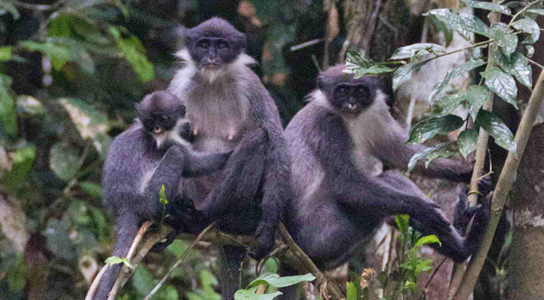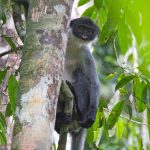Survey Team Rediscovers Near-Extinct Monkey In the Jungles of Borneo
January 20, 2012

Researchers rediscovered Miller’s grizzled langur in Borneo’s jungles, which was feared extinct, in the rain forest preserve of Wehea, located 90 miles west of the langur’s traditional territory. A mix of logging, agricultural encroachment, coal mining and fire has destroyed most of its natural habitat.
Initial surveys in the late 1970s placed the monkey in Borneo’s easternmost national forest. Thirty years later, all but 5% of its natural habitat has been destroyed. The langur was thought extinct, which is why researchers were shocked to spot it. A survey team accidentally captured the first images of the grizzled langurs in years.
Brent Loken, a conservation scientist at the Simon Fraser University is the co-author of a study published on January 20th in the American Journal of Primatology.
 Researchers don’t know much about Presbytis hosei canicrus. Loken and his team will have to act fast if they want to study the langurs, since they will move on quickly. It’s still uncertain if the Indonesian government will grant legal protection status for the Wehea area. P. hosei canicrus is among the most poorly understood of the primates in Borneo and among the IUCN’s critically endangered species list.
Researchers don’t know much about Presbytis hosei canicrus. Loken and his team will have to act fast if they want to study the langurs, since they will move on quickly. It’s still uncertain if the Indonesian government will grant legal protection status for the Wehea area. P. hosei canicrus is among the most poorly understood of the primates in Borneo and among the IUCN’s critically endangered species list.Loken and his colleagues placed observation blinds and camera traps near locations where animals might naturally congregate. They hoped to spot the elusive clouded leopard but instead found the langur. Initially, Loken’s team was unsure of what they had found since there were no previously recorded photographs of the langurs. They had to find museum specimens for comparison purposes.
Adult langurs weigh between 13 and 16 pounds, primarily live off leaves and tend to live in groups of one male, several females and their offspring. While the conservation laws in Indonesia are good, they are susceptible to corruption by logging, palm oil and mining companies. Half of Borneo’s original rain forests have disappeared since the 1950s.
No comments:
Post a Comment